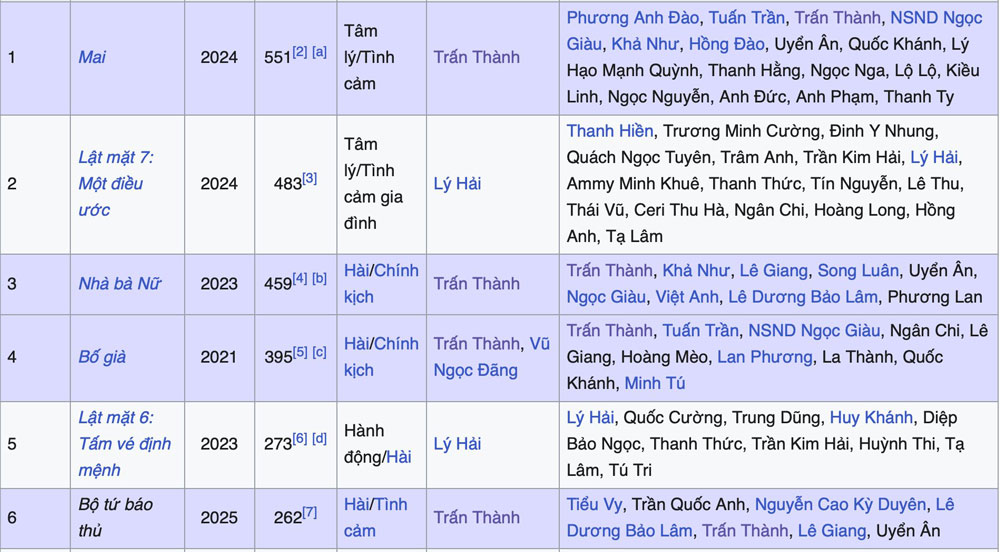Na Tra - the legendary figure of Chinese mythology, under the hands of the dumpling director (whose real name is Duong Vu, SN 1980, graduated from Pharmacy at Sichuan University), not just a war against fate but also reflected the people of dumplings.
Graduated from the pharmaceutical industry, there may be safe options, but he gave up to pursue the path of cartoons - a "crazy" decision when Chinese animation is also considered as inferior to Hollywood. or Japan. Without money, he lived on a discounted food, almost did not buy new clothes, was considered a "pension" of his mother.
In 2015, dumplings found investors to carry out Na Tra: Ma Dong So.
When released in 2019, the film immediately shocked with a revenue of 725 million USD (18,300 billion VND), reaching the preliminary round of excellent cartoon item at the 92nd Oscar.
With the next part Na Tra: Ma Dong Hai, after only a few days of release of the New Year 2025, the film has reached 793 million USD (20,380 billion VND), breaking the Chinese box office record and expected to reach 1.37 billion USD. - An unprecedented figure with a movie only shown in one market.
The success of Na Tra not only comes from profound content but also thanks to superior techniques, tight scenario and how to build sophisticated characters.
The film uses 1,900 skillful scenes, with 800 computers working continuously, creating eye -catching frames. But more importantly, the film hides the message of fate, choice and responsibility and even the issues of the times.
Na Tra in the movie is the abandoned, bearing the name "love ghost" right after being born. But he did not accept fate. He fought not only with the outside enemies but also with the prejudices binding himself.
That is the image of dumpling - a person who is skeptical by the film industry, but with the consistency that he dared to break through, he proved his value.
On Weibo, tens of thousands of spectators evaluate Na Tra's revenue "worthy", considering this as the lipstick of the Chinese animation industry, when the technical team is more than 100 companies of this country.
The majority of viewers commented better than expected, overcoming their imagination about the legend of Na Tra Dai Dai Ocean.
While Na Tra was on the flock of records, looking at Vietnamese cinema, the difference became clear.

Taking a look at the list of 6 Vietnamese films with the highest revenue, including: Mai (551 billion), overturned 7 (483 billion), Mrs. Nu's house (459 billion), the old father (395 billion), turning face 6 (273 (273 billion) and the quartet (262 billion), up to 4 films of Tran Thanh, 2 films of Ly Hai. All are Tet films, and these directors come up with the film almost every year.
No one denied the trade success of the two directors, especially Tran Thanh. It is also known that all comparisons are lame but which great value has really been created?
Compared to Na Tra, these films hardly invest in techniques or plot depth. They mainly revolve around the tragedy of family, love, stories that are easy to take tears, taking advantage of the "touching" psychology of the majority of the audience.
Tran Thanh's film is almost followed by a repeated formula: Family discord → conflict → Tears climax → mediation and taking advantage of beautiful cast. The image and rotation technique still retain the traditional way, there is no breakthrough in technology.
While Na Tra takes 10 years to release 2 films, the most popular Vietnamese films produced in the style of "instant noodles" - one movie each year.
The acceptance of Vietnamese audiences has helped such films successfully, but at the same time is dragging Vietnamese cinema into a boring loop. Without the directors who dare to think big, dare to step out of the safe area, but the most expensive Vietnamese film like the past will be just the films "watch and forget".
Dumpling not only made a cartoon, he made a story of his life, put the whole heart into the character Na Tra - a hated but still fighting to prove his value.
If Vietnamese cinema wants a work to life, it is necessary for those who dare to change - dare to challenge the path, dare to confront the failure to reach the peak.











